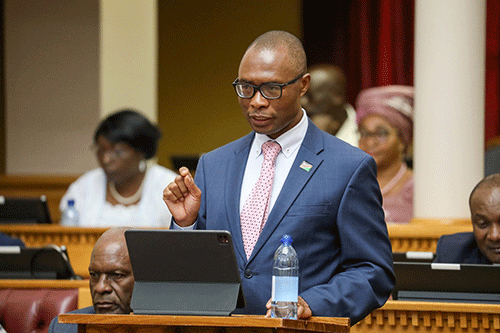While Finance and Public Enterprises Minister Iipumbu Shiimi continues to allocate billions in the domestic budget to prioritised sectors like education, despite repeated undesirable results, he has shown his frustration while reading his statement.
He said there is a need to get more value for every dollar spent on education.
Shiimi on Wednesday tabled the 2023/24 national budget in the National Assembly with an expenditure amount of N$84.6 billion, with an estimated revenue of N$74.7 billion.
“The education sector continues to absorb a growing share of the national purse. Of the total expenditure this year, 28.4% is earmarked for the education sector. This equates to 9.6% of gross domestic product (GDP), making Namibia one of the highest spenders on education the world over.
And yet, the actual education outcomes and return on these investments over time are not at all commensurate with our expectations”.
While there are gaps in terms of education infrastructure that need urgent attention, he believes there is also great scope for increased efficiencies in the utilisation of the current budget.
Looking at the outcome, the grade 11 (Namibia Senior Secondary Certificate Ordinary) and AS levels (formerly grade 12) results show that only 8 133 pupils or 24% qualified for tertiary education from the 38 019 candidates who sat for the 2022 national exams.
Shiimi did not shy away from increasing the allocation to basic education to N$16.8 billion in FY2023/24, and N$51.2 billion over the medium-term expenditure framework (MTEF). Of these allocations, more than N$200 million is earmarked for the recruitment of additional teachers to ensure adequate teacher-learner ratios in classrooms.
“Moreover, more than N$570 million
has been availed in the development
budget to cater for the construction and renovation of classrooms, as well as other education infrastructures such as hostels and offices,” he stated.
The higher education vote was allocated N$3.8 billion, 9.8% higher than the
preceding year. The additional allocation is to cater for student funding by the Namibia Students Financial Assistance Fund (NSFAF), as well as the completion and operationalisation of vocational training centres (VTCs).
“An allocation has been made to equip the Unam Medical School with the requisite equipment to facilitate training in the school of dentistry. Over the MTEF, the vote will receive an estimated N$11.8 billion,” said Shiimi.
Meanwhile, while addressing staff members earlier this month, education minister Anna Nghipondoka said the targeted intervention strategies will be achieved with the minimum resources at hand.
She said some of these interventions include efforts towards internal efficiency.
“Meaning, we need to do all we can to ensure a balance between the inputs from the fiscus and the outputs in terms of achieving all our key performance
indicators. More innovation and initiative will facilitate doing more with less,” Nghipondoka noted at the time.
Healthy investment
Shiimi gave the health and social services’ vote an amount of N$9.7 billion in FY2023/24, and N$29.4 billion over the MTEF. Within that allocation, he said government availed more than N$700 million to the ministry for investments in and renovations of health facilities, the recruitment of medical personnel as well as the acquisition of pharmaceuticals and ambulances.
During the year, the ministry will also develop the Universal Health Coverage Policy Framework to ensure that Namibians receive financial risk protection and improved access to quality healthcare services.
According to findings from the National Council report after the health standing committee’s visits to regions like
//Kharas, Hardap, Omaheke, Kunene, Omusati, Ohangwena, Oshana, Oshikoto, Otjozondjupa and Erongo, the sector is under distress. It is confronted by a myriad of issues that range from dilapidated facilities and a shortage of medication and personnel, which all compromise quality service delivery. The committee visited hospitals, health centres, clinics and maternal homes in those regions. “The committee observed that most public health infrastructure in all regions visited were in poor physical conditions, as evidenced by the cracking walls, peeling paint, damaged and falling ceilings and such other issues of dilapidation,” reads the report.
Public enterprises boost
Shiimi stated that the Ministry of Finance and Public Enterprises has been allocated N$5.8 billion, including N$2.7 billion for the public service medical aid scheme (PSEMAS) and N$425.4 million for transfers to public enterprises. Over the MTEF, this vote will receive N$20 billion.
Meanwhile, transfers to commercial
public enterprises have been reduced significantly over the MTEF. These allocations have gone down from over N$2 billion per annum in past years.
“A total of N$99.3 million has been budgeted for Agribank to support ongoing interventions in the agriculture sector, while the Development Bank of Namibia (DBN) will receive N$49.7 million to support the implementation of the SME Financing Strategy and youth entrepreneurship financing activities,” stated the minister.
During the 2023/24 financial year, the Environmental Investment Fund (EIF), through an ecosystem-based adaptation project funded by the Green Climate Fund, will provide grants amounting to N$120 million to 36 different community-based organisations for climate change adaptation, resilience and capacity-building.
The Namibia Revenue Agency is expected to get an increase in its yearly subsidy from N$400 million to N$900 million; Meatco will receive N$66.7 million annually; the Namibia Airports Company (NAC) will get a once-off N$47.5 million; the Namibia Competition Commission (NaCC) will get N$24 million annually; while the Road Contractors Company (RCC) will get N$55.9 million annually.



